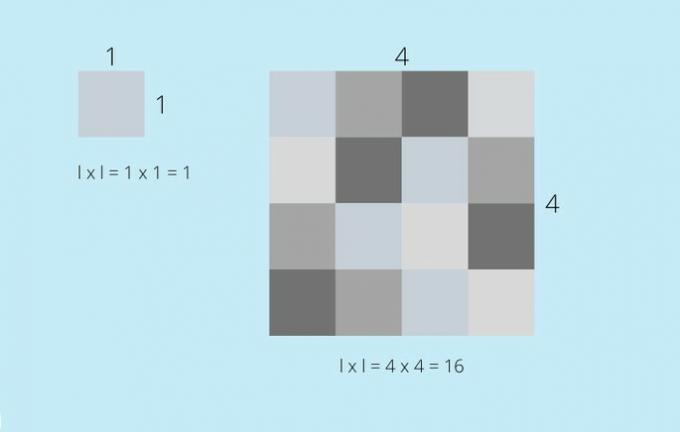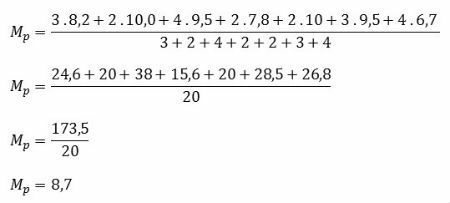A perfect square or perfect square number is a natural number that, if rooted, results in another natural number.
That is, they are the result of the operation of a number multiplied by itself.
Example:
- 1 × 1 = 1
- 2 × 2 = 4
- 3 × 3 = 9
- 4 × 4 = 16
(...)
The perfect square formula is represented by: n × n = a or no2 = the. Thus, no is a natural number and The is a perfect square number.
What are perfect square numbers?
The definition of a perfect square number can be understood as: a positive integer natural number whose square root is also a positive integer natural number.
So we have: 1, 4, 9, 16, 25, 36, 49, 64, 81, 100...
√1 = 1, √4 = 2, √9 = 3, √16 = 4, √25 = 5, √36 =6, √49 = 7, √64 = 8, √81 = 9, √100 = 10...

If we take geometry as a basis, we can think that a square is the figure that has sides with the same measure.
So the area of the square is l × l or l 2.
Every square whose sides are whole numbers will be perfect squares.

How to calculate if a number is a perfect square?
From the factorization of a number, if it has an exact square root and if it is the result of the square of other numbers, we can say that it is a perfect square.
Example:
2704 is a perfect square?
To answer the question, it is necessary to factor 2704, that is, calculate .

Hence, we have: 2704 = 2 × 2 × 2 × 2 × 13 × 13 = 24 × 132 .
√2704 = √(22 × 22 ×132) = 2 × 2 × 13 = 52
2704 is the perfect square number of 52.
perfect square rules
- A perfect square number is one that has an exact root.
- An odd perfect square number has its odd root and an even has an even root.
- Perfect square numbers never end with the digits 2, 3, 7, and 8.
- Numbers ending 0 have squares ending 00.
- Numbers ending in 1 or 9 have squares ending in 1.
- Numbers ending in 2 or 8 have squares ending in 4.
- Numbers ending in 3 or 7 have squares ending in 9.
- Numbers ending in 4 or 6 have squares ending in 6.
- Numbers ending 5 have squares ending 25
other relationships
The square of a number is equal to the product of its adjacent ones plus one. For example: the square of seven (72) is equal to the product of their adjacent numbers (6 and 8) plus one. 72 = 6 × 8 + 1 = 48 + 1 = 49. x2 = (x-1).(x+1) + 1.
Perfect squares are the result of a mathematical succession between the previous perfect square and an arithmetic progression.
12 = 1
22 = 1 + 3 = 4
32 = 4 + 5 = 9
42 = 9 + 7 = 16
52 = 16 + 9 = 25
62 = 25 + 11 = 36
72 = 36 + 13 = 49
82 = 49 + 15 = 64
92 = 64 + 17 = 81
102 = 81 + 19 = 100...
See too:
- Square Root Calculation
- Potentiation
- Radiation

